|
|
|
Sort Order |
|
|
|
Items / Page
|
|
|
|
|
|
|
| Srl | Item |
| 1 |
ID:
160359
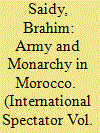

|
|
|
|
|
| Summary/Abstract |
The study of the complex relationship between army and monarchy in Morocco provides support for the argument that coup-proofing and institutionalisation enable civil leadership to enhance and maintain civilian control over the military. Through a strategy of coup-proofing implemented by the monarchy to protect itself from coups d’état, the army had been depoliticised. Through institutionalisation the Moroccan army is now governed by a clear set of constitutional and legal norms, principles and procedures with a system based on meritocracy. This approach is helping to stabilise relations between state and society and avoid power struggles between civilian leaders and the armed forces.
|
|
|
|
|
|
|
|
|
|
|
|
|
|
|
|
| 2 |
ID:
083726
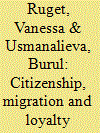

|
|
|
|
|
| Publication |
2008.
|
| Summary/Abstract |
Building upon recent studies in the field of citizenship and transnationalism, this article examines the relations that Kyrgyzstani migrants in Kazakhstan and Russia entertain with their homeland, both in terms of concrete status (rights and responsibilities) and subjective attitudes (feeling of membership and loyalty). The article relies on field research, including semi-structured interviews, conducted in March and April 2007. Findings show that Kyrgyzstani migrants have developed a distinctive and somewhat paradoxical relation to their state of origin, in which pragmatic interest and long-term loyalty are not easily reconciled
|
|
|
|
|
|
|
|
|
|
|
|
|
|
|
|
| 3 |
ID:
086658
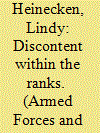

|
|
|
|
|
| Publication |
2009.
|
| Summary/Abstract |
Numerous studies have examined how armed forces have adapted their organizational and force structures to become more cost-effective, flexible, and deployable. However, comparatively few studies have looked at how these systemic influences affect attitudes toward military employment. With reference to findings of a survey conducted among middle-ranking officers in the United Kingdom, Canada, South Africa, and Germany, the attitudes of officers toward their current employment is examined within a comparative context, by referring to the impact of organizational restructuring on their careers and on commitment to military service; issues relating to pay, service, and work conditions; trust in military leadership's ability to defend their interests; and the perceived need for some form of independent representation. The study concludes that the present discontent within the ranks is creating a kind of professional or institutional disunity, which may necessitate a revision of how employee relations are managed within armed forces.
|
|
|
|
|
|
|
|
|
|
|
|
|
|
|
|
| 4 |
ID:
188955


|
|
|
|
|
| Summary/Abstract |
In his seminal book Exit, Voice, and Loyalty, Hirschman suggests that loyal members are less likely to exit when dissatisfied with the performance of the organization. In the context of a political regime, however, we argue that loyalty may actually encourage exit because loyal members are more sensitive to the performance decline of the regime. Using an original survey conducted in Hong Kong, we show that survey respondents with a stronger local identity have greater migration intentions. We also find that the heterogeneity of perceived political changes plays a significant role as a mediator. We discuss the political implications for Hong Kong.
|
|
|
|
|
|
|
|
|
|
|
|
|
|
|
|
| 5 |
ID:
145076
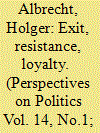

|
|
|
|
|
| Summary/Abstract |
A few years into the most recent wave of popular uprisings—the Arab Spring—studying regime trajectories in countries such as Syria, Egypt, and Yemen still seems like shooting at a moving target. Yet what has not escaped notice is the central role military actors have played during these uprisings. We describe how soldiers have three options when ordered to suppress mass unrest. They may exit the regime by remaining in the barracks or going into exile, resist by fighting for the challenger or initiating a coup d’état, or remain loyal and use force to defend the regime. We argue that existing accounts of civil-military relations are ill equipped to explain the diverse patterns in exit, resistance, and loyalty during unrest because they often ignore the effects of military hierarchy. Disaggregating the military and parsing the interests and constraints of different agents in that apparatus is crucial for explaining military cohesion during such crises. Drawing on extensive fieldwork we apply our principal-agent framework to explain varying degrees and types of military cohesion in three Arab Spring cases: Bahrain, Yemen, and Syria. Studying military hierarchy elucidates decision-making within authoritarian regimes amid mass mobilization and allows us to better explain regime re-stabilization, civil war onset, or swift regime change in the wake of domestic unrest.
|
|
|
|
|
|
|
|
|
|
|
|
|
|
|
|
| 6 |
ID:
167163
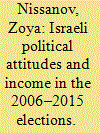

|
|
|
|
|
| Summary/Abstract |
It is commonly assumed that in Israel, higher income groups tend to hold more liberal views and vote for center-left parties while poorer segments of the population support rightwing parties. This article analyzes political attitudes and voting in four parliamentary elections by income groups, using the European Social Survey (ESS) data. By relying on transition matrices and mobility analysis, the article examines which income group is more loyal to the parties and political blocs. The results suggest that the percentage of rightwing voters within all classes is higher than that of leftwing voters. In addition, the poorest individuals are the most loyal voters while the richest are the most likely to switch parties and blocs. Finally, logit estimation shows that rightwing and ultra-orthodox voters are more likely to remain loyal to parties.
|
|
|
|
|
|
|
|
|
|
|
|
|
|
|
|
| 7 |
ID:
144826


|
|
|
| 8 |
ID:
186940
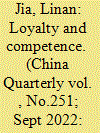

|
|
|
|
|
| Summary/Abstract |
Scholarly debate on the role of various contributing factors in cadre promotion yields conflicting evidence for different administrative levels in China, yet rarely has any quantitative evidence been presented for below the county level. This study explores the causal relationship between loyalty, competence and promotion at the township level. Based on an original dataset of local cadre training records, this paper utilizes cadres’ training experience at Party schools and academic institutions to account for loyalty and competence at the local level. Using a rigorous data-preprocessing method – coarsened exact matching (CEM) – this paper explores the causal effects of cadre training on promotion. The empirical results show that Party school training significantly increases the probability of promotion for township-level cadres, while university training contributes to chances of promotion to a lesser but indispensable degree. Moreover, local cadres who are both Party school and university trained enjoy the best chances of promotion.
|
|
|
|
|
|
|
|
|
|
|
|
|
|
|
|
| 9 |
ID:
112535


|
|
|
|
|
| Publication |
2012.
|
| Summary/Abstract |
The relationship of Diaspora Jewry to Israel has been the focus of intense, sometimes bitter debate, both before and after the establishment of the State of Israel.1 The creation of Israel in the shadow of the Holocaust and the "ingathering" of Jews from around the world in its first decade muted critical voices, even those who had been ambivalent.2 In the early years of the state, what began as harsh rhetoric about shlilat ha'golah (negation of the Diaspora) and the impossibility of full Jewish life outside of Israel, moderated and Diaspora Jews learned to love Israel, without feeling guilty about not making aliya. In particular among American Jews, perhaps the most settled Jewish Diasporans, Israel became a focus of extraordinary pride. The 1967 Six Day War was an exceptional moment that promoted solidarity. Since then, levels of support and engagement with Israel have remained consistently high, although there are some perturbations in levels of support associated with periods of heightened hostility or threats to Israel.3 Despite Gabriel Sheffer's claims about current Diaspora-Israel relations, attitudes toward Israel among Diaspora Jewry remain extremely positive. American Jews in particular are highly attached to Israel and there is little indication that recent political debates have changed the fundamental picture.
|
|
|
|
|
|
|
|
|
|
|
|
|
|
|
|
| 10 |
ID:
177552
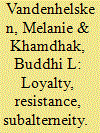

|
|
|
|
|
| Summary/Abstract |
This paper explores the process of construction of the interconnection between ethnicity, indigeneity, and political participation in Sikkim concerning the Limbu ethnic community. It firstly discusses Limbu associations’ claims for the reservation of seats for the Limbu community in the state legislative assembly, following the recognition of the group as a Scheduled Tribe in 2003. From this point on, the paper goes further back in time, and, based on archival documents, shows that the view of the lack of political representation of the Limbu as a result of ethnic discrimination is grounded in a ‘uncertain’ membership, which has historical roots dating back to the foundation of the kingdom. It shows that the troubled relations between the Limbu and the leading power in Sikkim in the early days of the kingdom long continued to inform their subaltern form of political membership.
|
|
|
|
|
|
|
|
|
|
|
|
|
|
|
|
| 11 |
ID:
178351


|
|
|
|
|
| Summary/Abstract |
Loyalty between soldiers is idealized as an emotion that promotes cohesion and combat effectiveness. However, little empirical work has examined how military personnel understand, feel, and enact loyalty. We use a symbolic interactionalist informed frame to explore the lived experience of 24 retired Australian Defence Force members via in-depth semi-structured interviews. Our analysis revealed three core themes: (1) Loyalty as reciprocity, where there was an expectation that loyalty would be returned no matter what. (2) The importance of emotional connection for cohesion. (3) Loyalty as a prioritizing process, where a soldier’s loyalties gave them a way of choosing between competing demands. Loyalty is a moral emotion that enabled sensemaking. Close interpersonal loyalties tended to trump wider/diffused loyalties. Respondents understood their loyalties to fellow soldiers within wider social constructs of mateship and professionalism. The findings show the risks that come from a reliance on loyalty for combat cohesion.
|
|
|
|
|
|
|
|
|
|
|
|
|
|
|
|
| 12 |
ID:
112537


|
|
|
| 13 |
ID:
141294
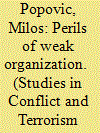

|
|
|
|
|
| Summary/Abstract |
Why do some militant groups defect against their sponsors, while others remain loyal? Pakistan's sponsorship of Jaish-e-Mohammad and Lashkar-e-Taiba offers a controlled case comparison as the former turned its guns against Islamabad, while the latter remained obedient despite a similar strength, ethnic ties to the regime, and the presence of alternative supporters. What explains Jaish's defection and Lashkar's loyalty? Drawing on organizational and principal-agent theory, I argue that militant organizations that are more decentralized and factionalized are more likely to turn on their sponsors, because their weak command and control as well as dispersed decision making limit the militant leaders' ability to follow through on their commitments to the sponsors and makes it more difficult for the sponsors to discipline the militant organization. When a sponsor attempts to coerce such organizations into submission by detaining militant leaders, freezing or confiscating their material assets the rank-and-file is likely to turn guns against the sponsor.
|
|
|
|
|
|
|
|
|
|
|
|
|
|
|
|
| 14 |
ID:
161765
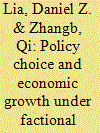

|
|
|
|
|
| Summary/Abstract |
This paper investigates how political elites make policy choices that have bearing on an authoritarian regime's economy, from the perspective of factional politics. A local leader makes policies primarily to secure his political survival, which is contingent on the support from either his higher-level patrons or his local grassroots constituents. Using a simple model, we show that a local politician with close factional ties to high-level patrons will invest more in sending loyalty signals to the latter to receive their protections, while a poorly-connected politician will make more effort to spur a broad-based economic growth that economically benefits his local constituents. Using a unique county level data on the factional politics of Zhejiang Province, China, we find that counties with weaker (closer) factional ties have lower (higher) tax burdens per capita, while spending more (less) on local public goods provision. The results are stable after various robustness tests.
|
|
|
|
|
|
|
|
|
|
|
|
|
|
|
|
| 15 |
ID:
170474
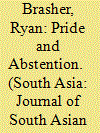

|
|
|
|
|
| Summary/Abstract |
Little research has been done on political dynamics within the Christian community in Pakistan itself, a lacuna I begin to address through survey research among Christian and Muslim students in Lahore. I ground this study in a detailed discussion of the existing literature on Pakistan, and comparative political research on national attachment of minorities elsewhere. I am particularly interested in assessing to what extent Christian students in Lahore have a strong sense of belonging and connection to the national community or feel marginalised from it. In fact, I find that Christians do have a strong sense of connection to their Pakistani identity, but are more inclined toward military rule and less interested in and knowledgeable about politics than their Muslim counterparts. Intra-Christian differences based on income level and denomination are apparent as well: Christian students from wealthier backgrounds have higher levels of political interest and knowledge, whereas poorer students and those affiliated with Pentecostal denominations have less political engagement but higher levels of nationalism.
|
|
|
|
|
|
|
|
|
|
|
|
|
|
|
|
| 16 |
ID:
155114
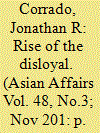

|
|
|
|
|
| Summary/Abstract |
Why has loyalty to the Kim Family Regime and the Worker’s Party diminished over the past twenty years despite a rise in the average standard of living, greater social mobility, and a regime policy of benign neglect towards marketization? Unthinkable in the Kim Il Sung era, the increase in expressions of resentment toward the North Korean authorities represents a shift in the ideology, behavior, and motivation of the population. Four critical factors have heightened tensions between state and society in North Korea, leading to a reduction in loyalty among the general population. The author considers the impact of labor mobilizations, the declining importance of party membership, the influence of foreign media, and the rise of rent seeking and extractive policies. While all play a role, it is important and possible to identify the primary cause. Extractive policies and rent-seeking position the regime and the people in a directly adversarial relationship. All tiers and agencies of the government have become complicit in efforts to siphon off profits, control market actors through crony capitalism, rent seek, over-regulate, and compete against private market actors, causing the residents to express frustration and resentment towards a government that does not have their interests at heart.
|
|
|
|
|
|
|
|
|
|
|
|
|
|
|
|
| 17 |
ID:
090446
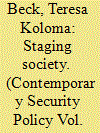

|
|
|
|
|
| Publication |
2009.
|
| Summary/Abstract |
Staging Society
Loyalty
Angolan UNITA
UNITA
|
|
|
|
|
|
|
|
|
|
|
|
|
|
|
|
| 18 |
ID:
120587


|
|
|
|
|
| Publication |
2013.
|
| Summary/Abstract |
A commonly proffered theory to explain the use of elections in authoritarian regimes is that they help identify talented young leaders who can be groomed for leadership positions. Unfortunately, due to the difficulties of obtaining data in authoritarian settings, this hypothesis has not been tested satisfactorily. We examine candidate-level data from the 2007 Vietnamese National Assembly (VNA) election and subsequent selection of candidates for top positions within the VNA and for top ministry positions. We find no evidence that vote share is associated with promotion to leadership positions in the VNA and only limited evidence for vote share association with ministerial posts. Instead, the results indicate that leadership selection takes place within the party rather than through elections. Furthermore, behavior within the assembly suggests that those who were chosen may have been selected based on their loyalty or at least pliancy to the party elites.
|
|
|
|
|
|
|
|
|
|
|
|
|
|
|
|
| 19 |
ID:
093856
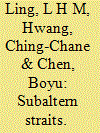

|
|
|
|
|
| Publication |
2010.
|
| Summary/Abstract |
Mainstream approaches perpetuate the Taiwan-China 'crisis'. They do so by following Cold-War concepts and prescriptions, despite the rise of new realities and new visions for cross-strait relations. We draw on Hirschman's identification of 'loyalty' and 'voice' to describe the mainstream discourse on cross-strait relations in Taiwan, mostly directed by the United States. But a third option is now emerging. It offers the possibility of a paradigmatic breakthrough or 'exit' based on articulations of a postcolonial subjectivity for Taiwan and its relations with China.
|
|
|
|
|
|
|
|
|
|
|
|
|
|
|
|
| 20 |
ID:
037976
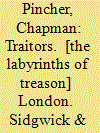

|
|
|
|
|
| Publication |
London, Sidgwick & Jackson, 1987.
|
| Description |
xvii, 346p
|
| Standard Number |
0283993790
|
|
|
|
|
|
|
|
|
|
|
|
Copies: C:1/I:0,R:0,Q:0
Circulation
| Accession# | Call# | Current Location | Status | Policy | Location |
| 028394 | 364.131/PIN 028394 | Main | On Shelf | General | |
|
|
|
|
|
|
|
|
|